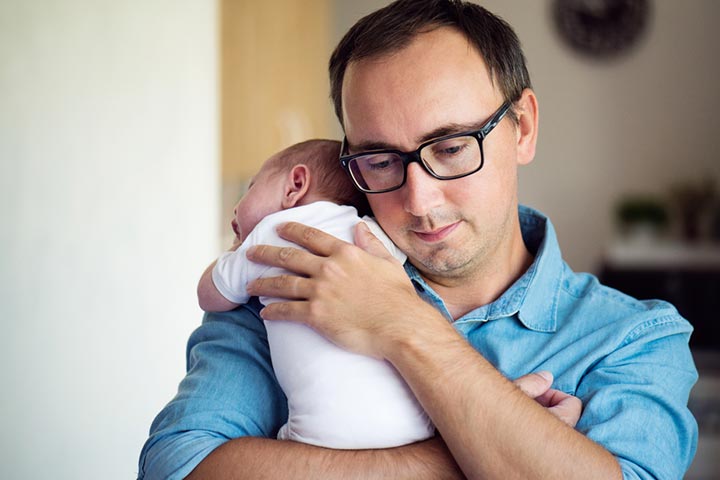
Image: Shutterstock
There are times when a mother may notice that her newborn won’t sleep unless held. While some babies like being held to sleep sometimes, some do not sleep at all without being held. Being held by the mother provides a feeling similar to that in the womb; the baby can feel your heartbeat and the familiar scent. However, holding the baby to sleep may not always be possible and may even be unsafe.
Read this post to learn the reasons why the newborn won’t sleep unless held and the ways to encourage them to sleep in a crib or bassinet without you holding them.
Reason Why Babies Only Sleep When Held
There may be several reasons your baby resists sleeping on their own, including
- Moro reflex (startle reflex): It happens when the baby is startled by a loud sound or movement during deep sleep. It causes them to extend their hands or legs and throw their head backward while crying (1). Thus, while putting your sleeping baby in their crib, an unconscious or improper movement may evoke the startle reflex and require you to pacify them in your arms.
Image: Shutterstock
- Feeling exhausted: If your baby has tired themselves out completely, they may become fussy and irritated, leading to difficulties while putting them down to sleep. Further, they may fall asleep in your arms, causing fussiness when you try to place them in their crib.
- Habit: If your baby has had the habit of sleeping in your arms since birth, this sleep association may cause them to resist sleeping alone.
Image: Shutterstock
- Separation anxiety: Separation anxiety is commonly seen in babies between six months to three years (2). It causes babies to become anxious when separated from their parents or caregivers, resulting in cranky and clingy behaviors.
How To Put Your Baby To Sleep Without Holding Them
The safe sleep guidelines by the American Academy of Pediatrics (AAP) suggests room-sharing to reduce the risk of sudden infant death syndrome (SIDS) but does not recommend bed-sharing (3). So if your baby refuses to sleep by themselves or without being held, try the following approaches:
- Swaddle your baby: Swaddling is the practice of wrapping your baby in a blanket like a burrito and it is the best way to combat the Moro reflex. It resembles the snug environment inside the womb, thereby helping calm the baby and promote good sleep (4).
 Caution
CautionImage: Shutterstock
- Keep your scent close: Before swaddling your baby, keep the swaddle blanket in close contact so that it catches your scent. Your lingering scent on the blanket may help your baby sleep better.
- Use white noise: White noise combines various sound frequencies to help reduce the impact of loud noises in the surrounding environment (5). Introducing white noise with a white noise machine while the baby is sleeping helps prevent them from waking up due to surrounding sounds or Moro reflex.
- Hold your baby before putting them down: Before putting your baby down to sleep in their crib at night, hold them in your arms for about 15 to 20 minutes or until they are drowsy. Then, place them in the crib before they fall asleep. This will encourage them to fall asleep independently and teach your baby to self-soothe (6).
Image: Shutterstock
- Avoid feeding your baby to sleep: Avoid feeding your baby to sleep to keep them from becoming used to such nighttime feedings, which may be difficult for you later. Instead, feed them shortly before putting them to bed (7).
 Point to consider
Point to consider- Soothe them without picking them up: If your baby becomes cranky after you put them down in their crib, avoid picking them up instantly. Instead, calm them by talking to them in a soft voice, patting them, rubbing their tummy or their head, and reassuring them.
- Hold them in a wrap: Hold your newborn in a baby wrap or sling during their awake time to help develop your bond with them and promote skin-to-skin contact. Baby wearing also helps soothe the baby, keep the baby cozy, and reduce the chances of fussing while being put down to sleep (8).
- Offer a pacifier: Giving your baby a pacifier keeps them calm and reduces the chances of SIDS (3).
 Quick tip
Quick tipFrequently Asked Questions
1. Can you spoil a newborn by holding them while they sleep?
In the first few months of life, bad habits do not develop as babies cannot consciously connect cause and effect. Responding to their needs teaches babies to trust that you will address them, which helps them become secure and confident over time (9).
2. When should you stop holding your baby to sleep?
You may stop holding your baby to sleep once they are six months old. You may introduce a bedtime routine at the same time, such as bathing them, putting on pajamas, cuddling and feeding, and then going to bed (10).
Newborns won’t sleep unless held is a common issue experienced by many new parents. Newborns prefer to snuggle with their mother since skin-to-skin contact can give them more secure feelings and calm them. Holding hands could help them experience the womb’s environment and often demands to be held until they fall asleep. This behavior may change gradually when the baby adjusts to the new surroundings. However, holding them in hands always is not advised as they may not learn to sleep alone in bassinet or cribs. Sleep training and bedtime routine can help the baby learn to sleep independently.
Infographic: Getting Your Baby To Sleep Without Having To Hold Them
Holding your baby until the time they are asleep can be a challenging experience for parents and caregivers. So, what should you do to ensure that your baby sleeps peacefully without you having to hold them throughout the process? The following infographic is the answer to this question. Check this infographic out to learn about a few tips that might help you put your baby to sleep more easily. Illustration: Momjunction Design Team
Get high-quality PDF version by clicking below.
Download Infographic
Key Pointers
- Your infant may refuse to sleep on their own out of habit or because they are anxious or tired.
- Swaddle or pat your baby to sleep instead of holding them.
- Avoid feeding your baby before bedtime to avoid getting used to overnight feedings.
- A pacifier can also help relax your infant and reduce the risk of sudden infant death syndrome.
References:
- Newborn Reflexes.
https://www.stanfordchildrens.org/en/topic/default?id=newborn-reflexes-90-P02630 - How to manage your child’s separation anxiety.
https://www.unicef.org/parenting/child-care/managing-child-separation-anxiety - How to Keep Your Sleeping Baby Safe: AAP Policy Explained.
https://www.healthychildren.org/English/ages-stages/baby/sleep/Pages/A-Parents-Guide-to-Safe-Sleep.aspx - Swaddling: Is it Safe?
https://www.healthychildren.org/English/ages-stages/baby/diapers-clothing/Pages/Swaddling-Is-it-Safe.aspx - What Is White Noise?
https://www.sleepfoundation.org/noise-and-sleep/white-noise - Sleep in Infants (2–12 Months).
https://www.nationwidechildrens.org/specialties/sleep-disorder-center/sleep-in-infants - Bedtime habits for infants and children.
https://medlineplus.gov/ency/article/002392.htm - My Newborn Only Naps If He’s Being Held.
https://www.zerotothree.org/resources/335-my-newborn-only-naps-if-he-s-being-held - Can you spoil a baby?
https://raisingchildren.net.au/newborns/connecting-communicating/bonding/can-you-spoil-a-baby - Frequent Night Awakenings: Why Is My Baby Crying During Sleep?
https://www.childrenscolorado.org/conditions-and-advice/parenting/parenting-articles/baby-crying-sleep/





















